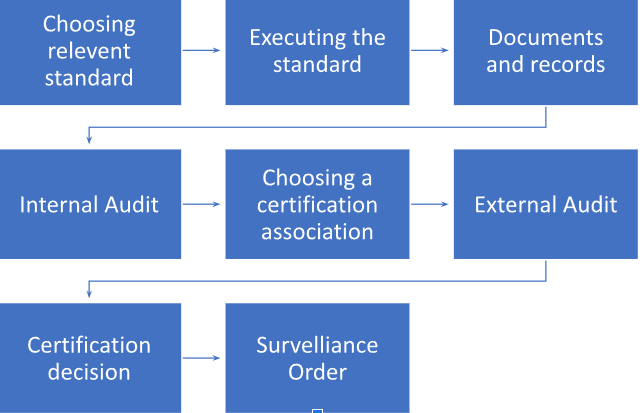
In today’s competitive world of business, obtaining ISO certification can be a game-changer for companies. It is considered a badge of honour, but also provides several benefits. The present article is about How ISO certification can benefit company performance, open doors to new opportunities, and enhance the value of the company. One can determine the power of ISO Standards and how they can support your business in the dynamic and demanding market of trade.
Table of content
Glimpses on ISO Standards
International Organization for Standardization standards is a bundle of world-identified instructions, criteria, and specifications that give a structure for best practices, and consistent quality in several fields. ISO is a non-governmental international organization, which improves and publishes these standards to provide international channels, increase safety, ensure the quality of goods and services, and innovation in the fields.
Here are the general elements of ISO Standards are:
- It is an international consensus;
- Addresses the risk mitigation;
- Access to new market;
- Assurance of consumers;
- Health safety;
- Consistency in the performances of business.
Short note on ISO Certification
ISO Certification is also known as ISO Compliance or accreditation. It means that the procedure by which a company attains the particular standards and instructions set up by the International Organization for Standardization (ISO). It is a non-governmental organization that enhances and publishes international standards by managing a wide range of sectors, practices and processes.
Certification of ISO includes a third-party assignment by an accredited certification association. To regulate in case a company is going to meet the guidelines of ISO standards like processes, management systems, goods and services.
Steps for obtaining ISO Certification
Here are certain steps for obtaining ISO Certification are as:

- Choosing the relevant standard: The company need to select the appropriate ISO Standard, which aligns with their specific purposes and requirements. Some common standards of ISO are ISO 27001 (Information security management); ISO 9001 (Quality management); and ISO 14001 (Environmental management), and many more.
- Executing the standard: The company executes the instructions of ISO standards in their policies, practices or procedures. It mainly includes the changes or developments to existing processes to meet the standard’s needs.
- Documents and records: The company makes documentation and maintains records to ensure compliance with the standards. The documentation provides evidence at the time of the certification procedure.
- Internal Audit: The company does internal audits to maintain compliance as per the ISO standard and recognize any areas for improvement.
- Choosing a certification association: The Company selects a certification association, which is also known as a certification agency and registrar. The certification association will do an external audit to measure the company’s compliance with the ISO standard.
- External Audit: This is done by the certification association to maintain the company’s adherence to the standards of ISO. This audit may involve on-site inspections documentation reviews, and interviews with employees.
- Certification decision: It depends on the external auditing report, and then the association makes a certification decision. In case the company fulfils the needs of standards, then grants the ISO certification.
- Surveillance Audit: ISO Certification is not a one-time process, but for maintaining certification. The company must undergo surveillance audits by the certification association to make sure the company’s compliance meets the needs of standards.
Process of ISO Certification Renewal online
How does ISO Certification benefit Companies?
ISO Certification can bring multiple benefits to companies across your field. Here are some of the key ISO Certification Can Benefit Company :
- Improved consumer satisfaction: ISO standard increases the consumer focus and consistency in enhancement. By executing ISO-certified processes. Companies may have a better understanding and fulfil the demands of consumers. This leads to higher consumer satisfaction and repeat business.
- Entry to new market: The certification has generally opened the doors for both domestically, and internationally to the new markets. Various government agencies and world organizations need certification of ISO as an essential for doing business with partners and suppliers.
- Improved Quality Management: In the ISO standard, ISO 9001 is the most recognized standard for quality management systems (QMS). ISO 9001 certification will help the companies to develop their whole quality control procedures. This may result in fewer defects, improve consumer satisfaction, and increase the quality of goods or services.
- Reduce cost and improve efficiency: ISO standards motivate companies to organise their performances, optimize resource uses, and eliminate waste. This leads to cost savings by decreasing expenses involved in operations, reducing errors, and enhancing productivity.
- Environmental obligations: The ISO 14001 certification provides a commitment to a sustainable environment and responsibility for business practices. That can help companies to decrease their environmental effect, attract eco-conscious consumers, and comply with environmental regulations.
- Improve credibility and reputation: This certification is committed to quality and best performances, which can boost the company’s reputation. Consumers, partners, and suppliers mainly view ISO-certified companies as more reliable and trustworthy.
- Enhance risk management: To maintain risk management, ISO provides the ISO 31000 certification. It helps companies to manage, control and recognize the risks more effectively. ISO-certified companies are more prepared to mitigate risks and respond well to unforeseen issues.
- Employment involvement and satisfaction: ISO standards are mainly attracting the attention and involvement of the employees, training, and growth. This can lead to more involvement in the workforce, increase productivity, and result in higher employee retention.
- Regulatory Compliance: ISO standards are mainly aligned with the regulatory needs of several industries. Attaining ISO certification can help organizations to make sure the compliances must be fulfilled as per state, national, and international regulations, decreasing the risk of legal problems and fines.
- Consistency in cultural improvement: ISO standards motivate the concept of continuous enhancement. By regularly updating and reviewing the procedure, companies can adapt to the changing market situations, and needs of consumers.
- Increase supplier relationships: ISO 14001 and ISO 9001 standards (environmental management) can increase relationships with suppliers. ISO certification makes the companies more rigorous supplier evaluation procedures.
End Notes
ISO certification does not provide the stamp of approval, but it is about positive change within companies. By the ISO Certification Can Benefit Company standards, companies can construct a solid foundation for efficiency, quality and consistency in enhancement. These standards help to increase consumer satisfaction, mitigate risks, decrease costs, and give competition in today’s era of marketplace. Furthermore, there is no one-time achievement as it commits to excellence and ongoing development, faces evolving issues, and makes sure the businesses remain agile.


